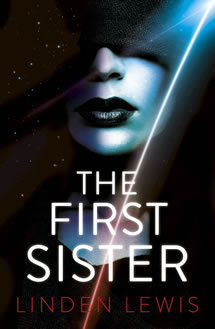Reviewed by Robert Goodman.
By Linden Lewis, Hachette, $32.99.
 There are only so many stories. And that goes doubly for a genre where many of the tropes and beats have been laid down by generations of writers. So when a newcomer is tackling space opera it comes as no surprise when their work appears to contain echoes of James SA Corey’s Expanse, or Anne Leckie’s Ancillary Trilogy or Yoon Ha Lee’s Machinery of Empire series, or even a touch of Star Wars. But Linden Lewis goes one further in their debut The First Sister in creating a universe and plot that also contains echoes of The Handmaid’s Tale. None of which is necessarily an issue, depending on whether they manage to pull it off.
There are only so many stories. And that goes doubly for a genre where many of the tropes and beats have been laid down by generations of writers. So when a newcomer is tackling space opera it comes as no surprise when their work appears to contain echoes of James SA Corey’s Expanse, or Anne Leckie’s Ancillary Trilogy or Yoon Ha Lee’s Machinery of Empire series, or even a touch of Star Wars. But Linden Lewis goes one further in their debut The First Sister in creating a universe and plot that also contains echoes of The Handmaid’s Tale. None of which is necessarily an issue, depending on whether they manage to pull it off.
The First Sister of the title lives aboard the spacecraft Juno, captured from the Icarii (who inhabit Mercury and Venus) by the Gaens (a coalition of Earth and Mars). As First Sister she is assigned to the Captain only, other Sisters being required to provide “comfort” and confessional services to the rest of the crew. When the book opens, though First Sister (she never knew her real name), has been left in the lurch by the outgoing Captain who was going to take her away with him. She is then given a task by her controller Aunt, get close to the new Captain, Saito Ren, and report on her (in breach of the usual religious rules governing the sisters).
At the same time Lito sol Lucius, of the Icarii, the scientifically advanced offshoot of humanity, is given a new mission: infiltrate the asteroid world of Ceres, recently captured by the Gaens from the Icarii, and kill the head of the Sisterhood. At the same time he is tasked with finding his old partner Hiro who has become a traitor, and kill him too. Hiro’s backstory is provided as a recording secretly sent to Lito and breaks up the alternative first person narratives.
There is lot of plot and exposition to get through which makes heavy early going. This is not helped by the fact that the two main first person narrative strands sound a little too similar to each other in tone. And all that is before the introduction of the Asters, genetically modified humans who live in the asteroid belt but who are also discriminated against and tend to do menial tasks in both Gaen and Icarii civilisations. And the hint of computer intelligences further out in the solar system which are deliberately keeping humanity locked in a four planet bubble.
While there is plenty of action and some effective twists towards the end, this often feels like incomplete world building. This is no more apparent than in the role of the Sisters. They serve as confessors, comfort women and power brokers, but there is little indication of how this came to be or why. While there are clear allusions to The Handmaid’s Tale (the use of the term “Aunt” for the Sisters’ enforcers, for example), the world of that book was built on a specific premise of infertility and sits within a male-dominated paradigm. In The First Sister, the reasons behind the development of the powerful religious matriarchy of the Sisterhood, that nevertheless sends its acolytes out to be used sexually by the armed forces, are never deeply explored and never really makes any sense, leaving the whole enterprise feeling a little hollow.
Where this book excels is in its representation of gender fluidity, and the fact that desire and relationships can happen irrespective of gender or gender labels. Linden Lewis, who identifies as a “queer writer”, brings this perspective strongly to the story. But this in itself has become a feature of some of the best recent space opera and is not in itself enough to make The First Sister stand out.
Lewis has knitted The First Sister out of the cloth of some great space opera. And while they have manage to mash up and spin this material into a new and sometimes interesting form, the seams sometimes show. Plenty of readers unfamiliar with those antecedents will just enjoy going along for what is an action filled ride. And this is only the first book in a series that shows plenty of promise, with enough to bring most readers back for a second helping.
This and 500 more reviews can be found at www.pilebythebed.com.



